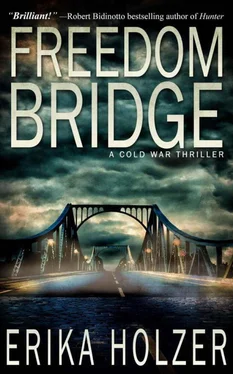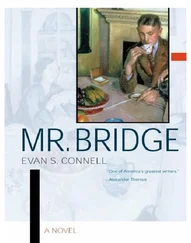“Hungry?” Adrienne asked her father-in-law as Kurt went off to mingle with his guests. “Since you have a few hours to kill, the rubber-chicken meal you’re likely to be served on Swiss Air won’t be able to compete with Pan Am Deluxe. How about a plate of hors d’oeuvres and a glass of wine? What’s your pleasure, a glass of Chardonnay?”
“Just what the doctor ordered. But shouldn’t you be circulating too?”
“Probably. The truth is, I’d much rather be with you.”
He squeezed her arm. “I hope my son realizes just how lucky he is.”
Adrienne managed a smile.
If you knew the truth, Max dear, it would break your heart.
After Max left, Adrienne lost track of time as Kurt mixed with the crowd, spending brief calculating minutes as he moved easily from person to person. From one small gathering to another.
When it was time to leave, Brenner helped Adrienne into her cape, took her arm, and led her out. “As much as I enjoy this sort of elaborate sendoff,” he confessed, sotto voce , “I’m eager to board and get the hell out of here.”
Adrienne was so fatigued that, with the aid of a sleeping pill and a comfortable seat pushed as far back as it would go, she fell asleep.
Brenner, in no mood for small talk, let alone arguments, was relieved. He had a lot to think about, starting with the only reason he was going to East Berlin.
He’d been summoned like a schoolboy, he thought with a flush of anger. He rang for the stewardess. When she appeared at his elbow, he ordered a gin and tonic. “Make it a double, will you?” he said.
Staring moodily as the liquid in his glass swayed torpidly with the plane’s vibrations, he was reminded of the lethargic waters of the Elbe River as it wound its way past the camp where he’d spent the last days of the war ministering to the sick, the wounded. And the dead.
* * *
“Medic! Medic!”
By March 1945, three years after he had enlisted in the United States Army to avoid being drafted, twenty-three-year-old Kurt Brenner, with a B.S (pre-med), an M.A. (biology), and a Ph.D (microbiology), had become Staff Sergeant First Class Kurt Brenner— “Doc” to the American soldiers he had served with in Germany since the invasion of Europe nearly a year earlier.
Brenner raced across an open field, dropping to his knees beside the mangled body of a soldier who had stepped on a land mine. He held one eyelid open. The pupil stared back, unseeing. Removing the young man’s dog tags from around his neck, Brenner walked away, swamped by emotion.
Months and months of blood and guts—literally. How much more can I take? The brass keeps saying the war will be over anytime now, but it’s already April, and we’re still not in Berlin! We’re still taking casualties!
He was thinking about the latest intelligence—die-hard Nazis concentrated in and around Berlin—when the usual cry for help sounded.
“Medic! Medic!”
Shaking off his reverie, Brenner took off running toward yet another mangled GI.
By early April, when American forces were roughly 120 miles from Berlin, Staff Sergeant Kurt Brenner was still grousing. Once Berlin was taken, he figured, the war would be over and he’d be on his way home. Time for the next step in the career he’d carefully planned before the war, he thought with a flood of relief.
But all American units heading for Berlin were stopped in their tracks. Held back by General Eisenhower’s orders from his Commander-in-Chief to allow the Soviets to take Berlin, Brenner and tens of thousands of others waited. Toward the end of April, the waiting appeared to be over. On the 22nd, the Soviets were in the north and east suburbs of Berlin. The next day, they had surrounded the city. A week later, the Red Army had taken most of the city, although fierce fighting continued at the Brandenburg Gate and the Reichstag. On April 30, 1945, Hitler committed suicide. In Europe, World War II was officially over.
But not for Doc Brenner. Although the Yalta Conference had provided for the Americans, British, and French to have occupation rights in Berlin, the Communists did not allow them to enter until roughly July 4, 1945.
* * *
On their drive from the blood-soaked beaches of France to the former Nazi capital, American soldiers were exposed to scenes that conjured images of hell. The bloated bodies of GIs who’d stormed French beaches. The sightless, the limbless, the lame and the halt. Nor was the detritus of war limited to combatants. Dead civilians—men, women, children—were strewn about like rag dolls. GIs tripped over carcasses of dogs and horses. Churches had lost their roofs. Homes were flattened, as if the Devil’s fist had smashed them into rubble. But the camps were an unmatched chamber of horror. Prisoners more dead than alive. Rigor mortis giving corpses the look of stacked firewood. Mountains of human bones. Piles of personal items, from eyeglasses to hair.
To these blistering images, burned into their consciousness, the advance parties of the American military added the fate of Berlin. During the war, American and British pilots had dropped 75,000 tons—1,500,000 pounds—of bombs on the city. Before the war there were a million-and-a-half dwellings in Berlin; by the end, 300,000. Of Berlin’s huge fleet of buses, only thirty-seven were serviceable, and less than one tenth of the city’s subway cars were of any use. As for Berlin’s many canals, virtually every bridge that spanned them had been destroyed by the Nazis. Worse, raw sewage was turning canal water into cesspools covered with scum that became favorite haunts for billions of flies and mosquitoes.
Shallow graves dotted city streets, parks, and public squares. Dead bodies lay unburied under the rubble. Edible food, if any could be found, was at a huge premium. Venereal disease was rampant. Thousands of women, raped by Soviet troops, had been abandoned by their families and cast out to fend for themselves.
Into this surreal city in early July 1945 came Kurt Brenner’s outfit. Setting up camp in the woods on the outskirts of the American zone across the Havel River from Soviet-controlled East Germany, the men were tasked with providing security for American staff personnel who were starting to move into the American zone. It took a long time before Brenner’s battalion began to achieve some degree of normalcy.
* * *
“Yo, Doc! The CO wants you on the double!”
Brenner sighed but took off running. He passed bedraggled German civilians headed toward the American zone as they tried to put distance between themselves and the Russian troops occupying the East. He’d seen endless streams of the poor bastards in the last few weeks as they plodded along, their miserable possessions wrapped in dirty sheets. The lucky ones were pulling wagons, household items piled high.
“Hop on the truck, Doc,” the CO said with a cursory wave toward a canvas-roofed vehicle the GIs called “a deuce-and-a-half” because it could carry a 2½-ton load. A couple dozen soldiers were in the process of climbing into the rear. First Lieutenant Joseph Cherner stretched out his hand to pull Brenner aboard.
“Where to, Joe?”
“Recon close to Potsdam this side of the river,” Cherner said. “Regimental commander’s orders.”
“What’s the CO want with me ?” Brenner groused.
“Best guess? The CO figures we could meet up with some Wehrmacht die-hards. We’d need a medic.”
“Hope not. I’m asleep on my feet,” Brenner said with a yawn. “After these guys get off the truck I’m crapping out. Wake me if I’m needed.”
“Roger.”
When Brenner opened his eyes, it was dark.
“Joe?”
“It’s okay.” Cherner was standing just outside the truck. “There’s nothing going on. The CO just got orders to pull back.”
Читать дальше












